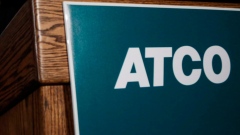Jul 11, 2023
This week is crucial for B.C. port strike, RBC report finds
, BNN Bloomberg
'With logistical changes, comes many obstacles' for small businesses amid B.C. workers strike
With little movement towards resolution in the strike at shipping ports in British Columbia, a new report from the Royal Bank of Canada suggests getting a deal done this week is crucial if the backlog of goods can be addressed quickly.
On June 30, 7,500 workers across more than 30 ports in B.C. walked off the job, as the International Longshore and Warehouse Union looks for wage increases, along with a slow down of contract work and automation. Talks resumed over the weekend as provincial and federal governments urged both sides to come to an agreement.
It’s important that a deal get done soon, RBC believes, as the bank estimates the current backlog of goods to be about 63,000 shipping containers, with only three ships scheduled to arrive by Thursday, but 10 more are slated for arrival in the two days afterwards.
“This represents an increase of more than 50 (per cent) of the backlog in just two days,” the report states. “If there was ever a ‘best time’ to find a solution, it would be before July 14.”
Additionally, the backlog is expected to balloon to 245,000 shipping containers if a deal is not reached by July 31, which would take more than three weeks to clear without any new arrivals.
The standstill is costing Canadian companies as well. Canadian Manufacturers and Exporters estimates $500 million in Canadian manufactured goods are disrupted for every day of the job actions.
Meanwhile, the B.C. Maritime Employers Association, the group negotiating with the ILWU, said $7.5 billion in cargo has been disrupted as of July 10.
“With approximately $19 billion of containerized cargo moving through Ports of Vancouver and Prince Rupert every month, as cited by VesselsValue, the potential impact of ongoing strike action on transpacific cargo flows is immense,” the association wrote in a news release.
At the Port of Vancouver, Canada’s largest port, RBC estimates there are 12 ships in waiting, with 37 expected by the end of the month and would represent a backlog of $11.7 billion in goods, based on a value of $65,225 per container.
Ships have already began to find alternate options. The report found that some ships are choosing not to idle in Vancouver, as they have in other backlog situations, and are instead going straight to Seattle.
Specifically, the MSC Sara Elena and the OOCL San Francisco diverted to Seattle, while 17 of the 37 ships scheduled to arrive in Vancouver by July 31 have either Seattle or Tacoma, Wash. on their next stop after Vancouver and could simply skip the Canadian stop.
If all 17 ships choose to skip Vancouver, it would represent a loss of $5.5 billion, RBC estimates.
“More than anything, this has the potential to create significant downstream issues, as either goods or ships will end up at a particular port at a time that diverges from the initial intended origin,” the report states.








